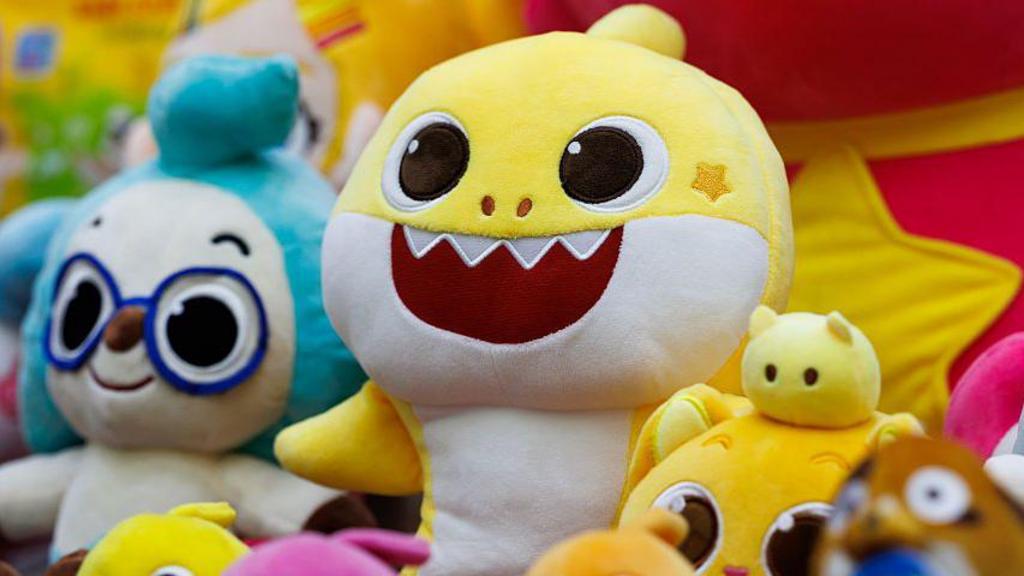In June 2016, when Kim Min-seok authorized the release of a 90-second children’s song clip, he unknowingly set off a phenomenon.
The result was a global sensation, amassing over 16 billion views and becoming YouTube’s most-watched video to date.
That song was the undeniably catchy “Baby Shark.”
Beyond captivating toddlers and simultaneously vexing adults worldwide, it established the groundwork for its creator, Pinkfong, to evolve into a media enterprise valued in the hundreds of millions of dollars.
“We didn’t anticipate it would distinguish itself from our other content,” Mr. Kim, Pinkfong’s Chief Executive Officer, stated from the company’s Seoul headquarters in an interview with the BBC.
“In retrospect, it represented a pivotal moment that paved the way for our international journey.”
That journey reached a new milestone on Tuesday as Pinkfong debuted on the South Korean stock market, with shares rising by over 9%, leading to a valuation exceeding $400 million (£304 million).
Founded in 2010 as SmartStudy, the company focused on creating digital content for children up to 12 years old.
Initially, the company had only three employees, including Mr. Kim and Chief Technology Officer, Dongwoo Son.
“The office was extremely small – even smaller than this,” Mr. Kim recalled, gesturing to the conference room from which he was speaking.
It was so small, he said through a translator, that “we weren’t even expecting a salary at the time.”
Pinkfong underwent several major adjustments, including narrowing its focus to toddlers.
The company expanded to around 100 employees and prioritized simpler, educational games and content. “And that’s when ‘Baby Shark’ emerged,” Mr. Kim stated.
The company has been known as The Pinkfong Company since 2022, a name inspired by a cheerful and curious fox featured in one of its early cartoons.
It now employs around 340 people, with offices in Tokyo, Shanghai, and Los Angeles.
“Baby Shark” is believed to have originated in the US in the 1970s and was often sung at children’s summer camps.
The song, which repeats the phrase “Baby shark, doo, doo, doo, doo, doo, doo,” is “attractive for children, though possibly annoying for adults,” according to media analyst Kevin Chew from Nanyang Technological University.
Mr. Kim is also keenly aware of its catchy nature.
“It’s like a K-pop song. It’s very fast-paced, rhythmical, and addictive,” he said, adding that the tune has a “chanting” quality, making it easy for children to remember.
However, it was not an immediate success and only gained momentum when its dance routine was showcased at children’s events in Southeast Asia.
Videos of children and adults dancing to the song began to circulate online, and the clip went viral.
Mr. Kim described a “festival-like feeling” in the Pinkfong office as the team watched its viewer numbers soar.
In November 2020, the “Baby Shark” clip secured the title of YouTube’s most-viewed video.
Mr. Kim said that it contributed about half of the company’s revenue in the years immediately following its release and became a springboard for new content and merchandise.
However, Pinkfong faced a legal challenge in 2019 when they were accused of plagiarizing the work of an American composer.
South Korea’s Supreme Court dismissed the case, accepting the company’s argument that its version was derived from a folk song in the public domain.
According to Mr. Kim, the victory gave the company a boost as its shares went public. He added that the stock market application had been submitted before the verdict was announced.
According to Korea University business lecturer Min Jung Kim, while Pinkfong’s other franchises, such as Bebefinn and Sealook, are growing rapidly, the company must prove that its success is not solely dependent on “Baby Shark.”
She noted that the company’s target audience is a major benefit as toddlers tend to watch the same content repeatedly.
Kim Min-seok insists that his business can expand beyond “Baby Shark,” which currently accounts for approximately a quarter of Pinkfong’s revenue. Meanwhile, Bebefinn has advanced significantly, generating roughly 40% of the company’s earnings.
One parent shared with the BBC that his family has mixed feelings about Pinkfong’s videos.
Saleem Nashef, a father of two, expressed his appreciation for the educational value of the company’s content, but his wife believes that “Baby Shark” is “too over-stimulating for kids.”
Despite this, the viral video is seemingly unavoidable, as his daughter, who is about to turn three, will have a Baby Shark-themed birthday party.
Professor Kim stated that it remains to be seen whether Pinkfong can create other characters with the same commercial appeal as “Baby Shark.”
Mr. Kim stated that the company raised almost $52 million in its stock market debut and plans to use the funds to expand its range of films and characters.
The company also aims to evolve into a “tech-driven” content creator, utilizing viewing patterns and other data to inform its new projects.
Mr. Kim said that Pinkfong has already accomplished “what many creators have always dreamed of.”
But now, it must demonstrate to investors that it is more than just a one-hit wonder.
Additional reporting by Rachel Lee from the Asia Specific podcast
Strange Brew in Bristol says it cancelled a gig by a Oi Va Voi after pressure from “activist groups”.
The Rolling Stones frontman visited The Mick Jagger Centre at Dartford Grammar School in Kent.
The vessel remains stuck on a reef and unable to move, but there is no risk of sinking, the Coast Guard said.
A proposed law will make it illegal to resell tickets for events such as concerts above face value.
Volunteers at Falmouth Repair Cafe fix vital equipment just in time for Arrested Development gig.

